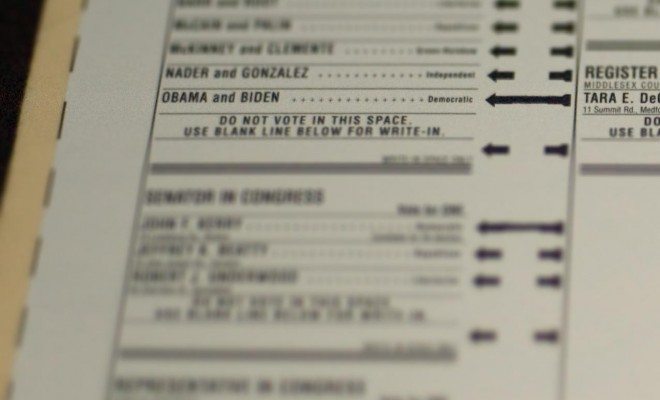 Image courtesy of [ChefMattRock via Flickr]
Image courtesy of [ChefMattRock via Flickr]
News
New Hampshire Voters: You May Now Take Ballot Selfies
New Hampshire voters will have a new way to celebrate their civic duty come the state’s primary election in February. On Tuesday, a federal judge struck down the state’s law that banned voters from showing a completed ballot to anyone–including sharing a photo on social media. According to the ruling, ballot box selfies are now a protected form of free speech.
New Hampshire is not the only state with this sort of law, in fact, most states have laws prohibiting voters from showing their marked ballot to the public. Although many of these laws are on the books, most states tend to have lax enforcement policies. Unlike most states, however, the New Hampshire law was recently updated to include digital images and social media–effectively banning ballot selfies. Those changes prompted the American Civil Liberties Union of New Hampshire (ACLU-NH) to file a lawsuit against the state, citing the law as an undue ban on free speech.
State Representative Leon Rideout, Brandon Ross, and Andrew Langlois were the plaintiffs in the ACLU-NH’s lawsuit. All three voted in the primary election last September, took pictures of their ballots, and shared them online. Out of protest, Langlois opted to vote for his recently deceased dog, Akira, instead of the available primary candidates. While voting, Langlois took a picture of his ballot with his phone and later shared it on Facebook. Shortly after posting the photo, he got a call from the New Hampshire Attorney General’s Office notifying him that he was being investigated for possible election law violations. Before it was stuck down, violating the law was punishable by fines of up to $1,000. Rideout and Ross were also investigated for their posted pictures.
The ACLU-NH argued that the law’s restrictions violate voters’ right to free speech, and the court agreed. On the other hand, Secretary of State William Gardner argued that the law helped stop vote buying and coercion because it prevented someone from proving who they voted for. In a 42-page decision, U.S. District Court Judge Paul Barbadoro ruled that the law was not narrowly tailored to achieve a compelling state interest in regulating free speech, the traditional test in First Amendment cases. While the judge noted that coercion and vote buying have historically been important issues, they no longer pose a risk to the election process. In his ruling, the judge noted,
He [the secretary] produced no evidence that either vote buying or voter coercion are current problems in New Hampshire. Plaintiffs, in contrast, have produced undisputed evidence that there have been no vote buying prosecutions and no complaints of vote buying in the state since at least 1976.
While the law was enacted with good intentions–preventing coercion and vote buying–the issues that it aimed to address are generally not that important anymore. Even if such fraud were to occur, other laws still make it illegal and the government can still prosecute misconduct. More to the point, selfies and the ability to share pictures of civic participation online are important forms of free speech. For better or worse, ballot box selfies are a free expression and they are here to stay–at least in New Hampshire.








Comments